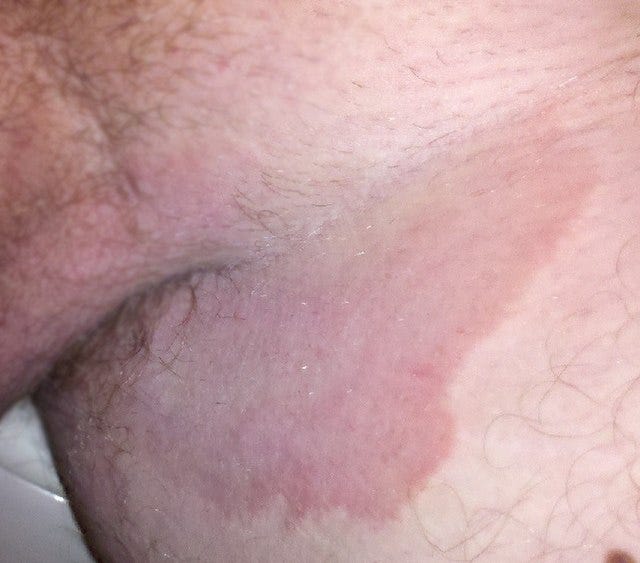Case study
Prof G, I am 56 years old with an EDSS of 8.0, and I keep getting skin infections in my groin area. I have repeated courses of antibiotics, but the infections keep returning. When I get infections, the odour is horrendous. What can I do?

Prof G’s opinion
This patient is describing intertrigo. Intertrigo is a superficial inflammatory condition of the skin and occurs in areas where the skin rubs on the skin. Intertrigo typically occurs in the groin, armpits, under the breasts, and between skin folds. The latter usually occurs in people who are overweight or obese. Intertrigo is associated with warm temperatures, friction or rubbing, moisture and/or sweating, poor hygiene and poor ventilation.
MS-related intertrigo occurs more often in people with more advanced MS, particularly wheelchair users with difficulty maintaining perineal hygiene. The perineum is the area of the body that covers the pubic area and buttocks. Risk factors for intertrigo include urinary and faecal incontinence, obesity, diabetes, thyroid dysfunction, immunosuppressive therapies, in particular corticosteroids, and excessive sweating.
Another name for intertrigo is a sweat rash. Many pwMS may have excessive sweating due to autonomic problems from spinal cord disease.
Intertrigo typically starts as a red rash in your skin folds that may itch, sting or burn. If a secondary infection occurs, which can be due to yeast (candida) and/or a bacterium, the skin becomes inflamed, and a foul-smelling discharge develops. Intertrigo can be associated with folliculitis, where infection of the hair follicles occurs.
If a secondary infection occurs, the patient will require antibiotics and/or antifungals to treat the infection. In addition, the patient needs to improve their hygiene with frequent washing, improved ventilation and using powders and ointments to reduce friction between the skin folds.
Talcum and non-talc powders keep these areas dry and help reduce friction between skin folds. Please be aware that, in all likelihood, talcum powders will be taken off the market. Their use is associated with ovarian cancer in women, and they often contain low levels of asbestos. However, there are new non-talc powders that you can use.
Zinc oxide-based ointments, such as Sudocrem, can be tried. Sudocrem contains lanolin, zinc oxide and paraffin. Lanolin acts as an emollient to soothe and soften the skin, zinc oxide reduces the loss of fluid and acts as an antibacterial, and paraffin repels fluid and creates a protective seal over the skin. Other topical creams may include anti-fungal and antibacterial agents that work very well. For example, the topical antifungal creams used to treat intertrigo are nystatin (for Candida) and azole drugs, including miconazole (Mitrazol), ketoconazole (Nizoral topical), or clotrimazole (Lotrimin AF cream).
I also recommend people with intertrigo use antifungal shampoo to wash with; the two most commonly prescribed are Selsun Blue of Nizoral shampoo.
If you are overweight or obese, you should attempt to lose weight. Obesity medicine is a rapidly evolving medical speciality, and the results of newer interventions are remarkable. In particular, low carbohydrate diets, intermittent fasting, behavioural therapy, appetite suppressants, bariatric surgery and the emergence of glucagon-like peptide-1 receptor agonists, or GLP-1 receptor agonists, such as semaglutide. Please speak to your HCP about getting a referral to an obesity clinic; one of our local clinics has a long wait, so it is better to get referred earlier than later.
Then there are simple things to do, such as bathing frequently and ensuring you dry yourself well. The latter may require a hairdryer to ensure all the moisture is gone between your skin folds before applying a powder or ointment. Wear loose clothes that allow ventilation. Change your underwear frequently. Improve your hygiene. You must see a continence advisor if you are incontinent of urine and/or faeces. In the modern area, there is a lot we can do to prevent and/or manage incontinence.
Metabolic Health
All patients with intertrigo should have a metabolic health check to ensure they are not diabetic or have pre-diabetes. At the same time, it is worth ensuring you don’t have an underactive or overactive thyroid function, both of which are associated with intertrigo.
Menstrual hygiene
Perineal hygiene also includes menstrual hygiene. There are a large number of online resources concerning the latter. If you are disabled and find dealing with your periods problematic, you can have hormonal therapies to suppress menstruation. The hormonal therapies could be oral tablets or delivered via an intrauterine device (Mirena coil).
Excessive sweating
If you suffer from excessive sweating, try using an antiperspirant. Yes, you can use the same antiperspirants for your armpits in your groin, under your breasts and skin folds. Some products are marketed specifically for the groin but are more expensive. Medical treatments for excessive sweating include anticholinergics drugs, topical botox injections and denervation surgery, where the sympathetic ganglia that control sweating are blocked or destroyed.
Red flags
When a disabled patient who needs care develops intertrigo, you should review their care needs to ensure they are not being neglected. For example, it is inappropriate for incontinent patients to be left unchanged for hours. This contributes to intertrigo and is a risk factor for pressure ulcers. In the UK, pressure ulcers are a red flag and a notifiable condition that must be investigated. They are potentially a sign of physical neglect. Intertrigo is a red flag, as is poor foot hygiene and several other MS-related complications.
Conclusion
I know many of you find these kinds of newsletters depressing because they remind you of the underbelly of MS and MS care. But treating and/or preventing intertrigo can make a massive difference to the quality of life of someone with MS, and most of the interventions above can be self-initiated.
I would be interested to know if you have had intertrigo, what solutions you found to help treat it, and what you have done to prevent it from reoccurring. Menstrual hygiene and the suppression of menstruation are other topics worth opening up for further discussion. How many of you who are premenopausal are taking hormonal therapies to suppress menstruation or are using the Mirena coil?
Subscriptions and donations
Paid subscriptions to MS-Selfie are being used to administer the Newsletter and associated MS-Selfie microsite, which is now open to all readers. At the request of several readers, I have now added the option of making a one-off donation. To keep this initiative open to all readers, I would appreciate it if those who can afford a subscription to subscribe. For active paying subscribers, thank you; your contribution is much appreciated. Because of the falloff in paying subscribers, I am considering returning to a paywall that will give paying subscribers six months of unlimited access to all newsletters. At the same time, free subscribers will have a wait to access the newsletters later, not as an email, but on the substack site.
General Disclaimer: Please note that the opinions expressed here are those of Professor Giovannoni and do not necessarily reflect the positions of Barts and The London School of Medicine and Dentistry nor Barts Health NHS Trust. The advice is intended as general and should not be interpreted as personal clinical advice. If you have problems, please tell your own healthcare professional, who will be able to help you.













Share this post